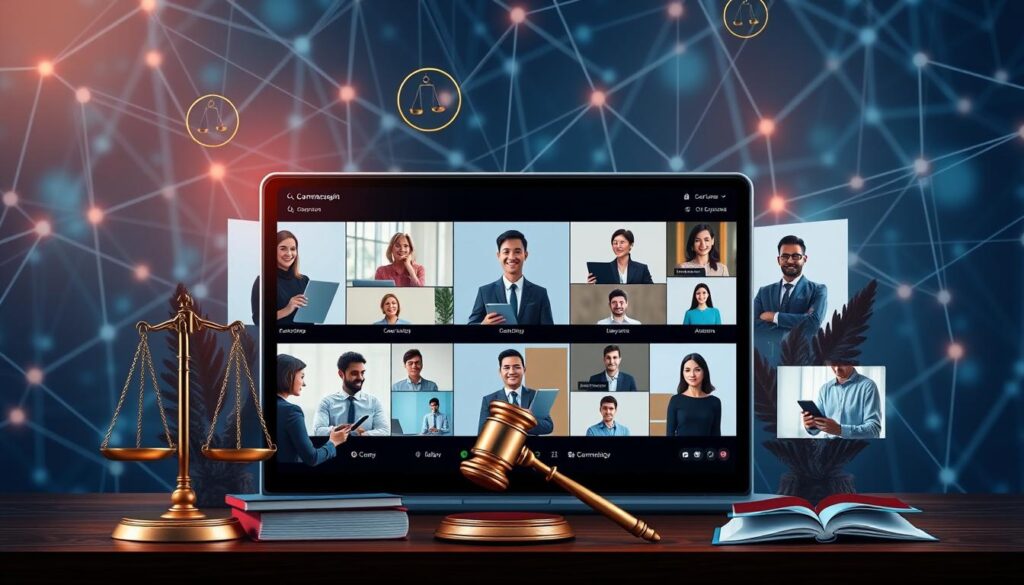Did you know that over 6.3 million individuals in the UK sought legal advice online last year? The legal landscape has undergone a remarkable shift, thanks to the rapid digital transformation. This shift has made online legal resources more accessible than ever before. Whether you’re a business owner, a student, or a private citizen, navigating the complexities of the British legal system can be a daunting task. Fortunately, a wealth of virtual law libraries and digital tools are now available to provide the support and guidance you need.
Key Takeaways
- The UK legal system is increasingly accessible through a range of online resources
- Digital legal tools and virtual law libraries offer convenient and efficient access to law help and support
- Utilising online legal resources can empower individuals and professionals in understanding their rights and obligations
- Navigating the legal landscape is made easier through the availability of various digital platforms and forums
- Reliable and credible online sources are essential for accurate legal information and guidance
Understanding Legal Resources Available Online
In the digital era, accessing legal resources has never been simpler. Online legal databases, e-resources for lawyers, and a plethora of web-based legal tools have transformed the legal landscape. They have redefined how legal professionals and individuals engage with legal issues.
What Are Legal Resources?
Legal resources span a broad spectrum, including legislation, case law, legal commentary, and industry-specific guidance. These materials are crucial for understanding the intricate legal environment. They offer vital information and perspectives.
Types of Legal Resources
- Legislation databases: Offering comprehensive access to statutes, regulations, and other legal texts.
- Case law repositories: Providing in-depth information on judicial decisions and precedents.
- Legal journals and publications: Featuring expert analysis and commentary on legal topics.
- Online legal directories: Connecting individuals with legal professionals and services.
Benefits of Using Online Legal Resources
The advent of digital legal databases and web-based legal tools has introduced significant benefits. These resources enhance accessibility, reduce costs, and provide timely updates. They empower legal professionals and the general public to navigate the legal terrain more effectively and efficiently.
Finding Legal Help in the UK
Confronting legal challenges necessitates the engagement of professional legal expertise. In the UK, a plethora of avenues exists for accessing legal support, encompassing government-funded initiatives and private legal entities. This discourse delves into the primary pathways for individuals in pursuit of legal assistance within the United Kingdom.
Legal Aid Services
Legal aid, a government-backed initiative, offers free or subsidised legal representation to those financially incapable of retaining a solicitor. Eligibility hinges on income, assets, and the legal issue’s nature. Those meeting the criteria can avail themselves of a spectrum of services, including legal advice, assistance, and courtroom representation.
Pro Bono Services
Complementing legal aid, numerous law firms and legal professionals in the UK extend pro bono services. These encompass free or discounted legal aid for those in need, addressing a broad spectrum of legal concerns. Individuals can leverage online legislation portals, internet law repositories, and digital law firm resources to discover pro bono opportunities within their vicinity.
Online Legal Directories
For direct connections with legal professionals, online legal directories serve as a pivotal resource. These digital platforms facilitate the search for solicitors, barristers, and legal specialists by location, expertise, and client feedback. By employing these online directories, individuals can efficiently locate and compare qualified legal services in their vicinity.
Essential Websites for Legal Information
In today’s digital era, the internet has evolved into a vast repository of legal resources for both individuals and businesses in the United Kingdom. It encompasses a wide array of legal information, from government portals to non-profit organisations and educational institutions. This plethora of legal resources online is waiting to be explored. Let us examine some of the critical websites that serve as primary sources for dependable legal information.
Government Resources
The legislation.gov.uk website stands as a paragon of legal information in the UK. Operated by the government, it offers direct access to the latest legal research and legislation. This makes it an indispensable tool for keeping abreast of the dynamic legal environment.
Non-Profit Organisations
Non-profit organisations are pivotal in providing cloud-based legal knowledge banks to the public. The Citizens Advice website exemplifies this, offering a vast repository of information on legal topics such as consumer rights and employment law. It is a crucial resource for those seeking legal advice.
Educational Institutions
Law schools and universities in the UK significantly contribute to the legal resources online landscape. The University of Oxford Law Faculty and the UCL Laws websites are exemplary. They provide a wealth of legal information, including research papers, lecture materials, and legal databases. These resources are invaluable for those seeking comprehensive legal knowledge.
By exploring these essential websites, individuals and businesses in the UK can tap into a diverse range of cloud-based legal knowledge banks. This empowers them to stay informed and proactive in their legal affairs.
How to Use Online Legal Forums

In the digital era, online legal forums have emerged as crucial assets for legal professionals and individuals in need of legal counsel. These platforms, serving as virtual law libraries and digital legal databases, are repositories of extensive information and a community of legal experts and enthusiasts. To maximise the benefits from these e-resources for lawyers, a strategic approach is essential.
Joining Legal Discussion Groups
The initial step in engaging with online legal forums is to participate in relevant discussion groups. These can be accessed on platforms such as Reddit, LinkedIn, and specialised legal community websites. It is advisable to select groups aligned with your specific legal interests or concerns, whether in employment law, intellectual property, or family law.
Posting Legal Queries
After joining the appropriate groups, you can start posting your legal inquiries. It is imperative to provide comprehensive details, including all relevant facts and applicable laws or regulations. This approach ensures that the community can offer the most precise and beneficial advice.
Navigating Responses
When you receive responses to your queries, it is vital to evaluate them critically. While online forums are a rich source of information, the advice given may not always be accurate or directly applicable to your situation. It is crucial to view online legal advice as a starting point, and to seek the counsel of a qualified legal professional for tailored guidance.
By adhering to these guidelines, you can harness the potential of online legal forums to enhance your knowledge, connect with peers, and potentially find support in legal matters. Remember, these virtual law libraries and digital legal databases are invaluable resources. However, they should not supersede the expertise of a qualified lawyer.
Online Tools for Legal Document Preparation
In the digital era, web-based legal tools have transformed the management of legal matters for individuals and businesses. These online platforms provide a convenient and accessible solution for legal document preparation, catering to a broad spectrum of needs. They enable users to access document templates and utilise legal writing assistance, making the legal landscape more navigable.
Document Templates
Online legal resources offer a significant advantage through the availability of comprehensive document templates. These templates, accessible on various online legislation portals and internet law repositories, serve as a structured foundation for drafting critical legal documents. Users can tailor these templates to meet their specific needs, ensuring compliance with legal formalities.
Legal Writing Assistance
Furthermore, web-based legal tools provide substantial assistance with legal writing. These resources include features such as grammar and style checking, along with guidance on legal terminology and formatting. By utilising these aids, individuals and businesses can improve the clarity, precision, and professionalism of their legal documents.
While these online tools are invaluable, it is crucial to remember their limitations. They should not replace the expertise of a qualified legal professional. It is advisable to have any critical legal documents reviewed by a solicitor or barrister to ensure legal compliance and address any unique circumstances or nuances not fully covered by generic templates or writing assistance.
The Role of Law Libraries
In the digital era, law libraries have undergone a profound transformation. They have transitioned from mere physical repositories of legal knowledge to digital centres, offering unparalleled access to a plethora of online resources. This metamorphosis has fundamentally altered the dynamics of legal engagement for both professionals and the general public.
Accessibility to Online Libraries
The advent of digital law firm resources and cloud-based legal knowledge banks has significantly enhanced the accessibility of law libraries. The necessity of physically visiting a library for research has been eradicated, replaced by the convenience of legal resources online accessible with mere clicks. This development empowers users to engage with legal materials at their own pace and convenience.
Utilising Online Databases
Law libraries have fully embraced the digital age by establishing extensive online databases. These databases enable users to effortlessly search and access a vast repository of legal documents, case law, and scholarly articles. The integration of digital law firm resources and cloud-based legal knowledge banks has transformed legal research, offering a comprehensive and efficient alternative to traditional print-based methods.
- Seamless access to a vast array of legal resources online
- Ability to search and retrieve specific legal materials with ease
- Collaboration with legal professionals to ensure the relevance and accuracy of digital law firm resources
Through embracing digital transformation, law libraries have emerged as pivotal centres for legal resources online. They empower both legal professionals and the general public to navigate the complexities of the law with enhanced ease and efficiency.
Understanding Legal Rights and Obligations
In today’s intricate legal environment, grasping one’s fundamental legal rights and obligations is paramount. This discourse focuses on two pivotal domains: consumer rights and employment rights. It offers profound insights into the avenues for online legal research and self-education.
Consumer Rights
As a consumer, you are endowed with specific rights designed to safeguard you against unjust practices. These rights ensure you receive the goods and services you have paid for. Engaging in online legal research empowers you to navigate the realm of consumer protection laws. It enables you to make well-informed decisions and assert your rights when required.
Employment Rights
Understanding your employment rights is indispensable, whether you are an employee or an employer. These rights encompass a spectrum from workplace safety to equitable compensation. Digital legal databases and virtual law libraries serve as invaluable resources for deciphering the complexities of employment law.
Utilising these online tools and resources empowers individuals to manage their legal rights and obligations effectively. This enables them to make informed decisions and safeguard themselves across various life domains.
Online Courses and Tutorials

In the digital era, the legal sector has embraced online learning, catering to lawyers and legal enthusiasts. The Internet has become a valuable asset for legal knowledge and skill enhancement. It offers a plethora of continuing legal education and self-study resources.
Continuing Legal Education
Ongoing professional development is essential for lawyers to remain current with legal advancements and best practices. Online courses and webinars provide a flexible means for legal professionals to meet their continuing legal education (CLE) obligations. These e-resources for lawyers span a broad spectrum of topics, from industry-specific updates to soft skill training. This flexibility allows lawyers to customise their learning to suit their unique needs.
Self-Study Resources
- A vast array of web-based legal tools and online legislation portals is available for those interested in law or looking to broaden their legal knowledge. These resources cater to a wide range of legal subjects, appealing to both novices and seasoned learners.
- Online tutorials, interactive simulations, and virtual legal clinics offer practical learning experiences. They enable users to apply their knowledge in real-world scenarios.
- Podcasts, video lectures, and e-books provide engaging and accessible ways to explore legal topics at one’s own pace.
The rise of online legal resources has transformed legal education and skill development. By utilising these digital tools, lawyers and law enthusiasts can improve their expertise, stay updated, and navigate the dynamic legal landscape more adeptly.
The Importance of Legal Research
In the dynamic realm of law, the imperative to remain abreast of developments is paramount. Legal research emerges as a critical component, facilitating comprehension of the legal system’s intricacies. It ensures adept navigation through its complexities. For legal professionals, business proprietors, or individuals in quest of legal counsel, the utilization of internet law repositories, digital law firm resources, and cloud-based legal knowledge banks can revolutionize one’s approach.
Key Research Strategies
Initiating effective legal research necessitates a profound grasp of the pertinent issue. Commence by pinpointing the applicable laws, regulations, and precedents relevant to your scenario. Utilize internet law repositories and digital law firm resources to access a vast repository of data, encompassing governmental websites and legal databases.
Evaluating Legal Sources
Not all legal sources are of equal standing. It is imperative to scrutinize the credibility and pertinence of the information unearthed during your research. Seek out authoritative sources, including governmental agencies, esteemed legal publications, and cloud-based legal knowledge banks. Verify the timeliness and precision of the data to guarantee reliance on the most current and dependable legal wisdom.
By embracing the extensive array of internet law repositories, digital law firm resources, and cloud-based legal knowledge banks accessible online, one can attain a profounder understanding of legal frameworks. This enables the formulation of informed decisions, safeguarding one’s rights and interests.
Combating Misinformation in Legal Matters
In the digital era, the task of navigating the vast expanse of legal information online is formidable. The proliferation of misinformation necessitates a heightened sense of discernment when seeking legal counsel or resources. By identifying veritable sources and steering clear of common pitfalls, one can guarantee access to dependable and precise information, thereby addressing legal concerns effectively.
Identifying Credible Sources
When delving into legal topics online, it is imperative to seek content from esteemed organisations. Government websites, legal aid charities, and academic institutions are prime candidates for authoritative and current information. Furthermore, corroborating your findings with respected legal publications and seasoned legal professionals is advisable to affirm the accuracy of the information.
Avoiding Common Pitfalls
Be cautious of websites or forums purporting to offer legal advice without proper credentials or disclaimers. Misinformation, especially on intricate legal issues, can result in significant financial repercussions. Prioritise resources that transparently disclose their qualifications, reference pertinent laws and regulations, and advise on the necessity of professional legal consultation.
